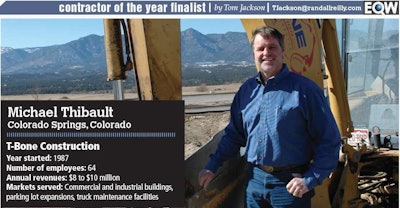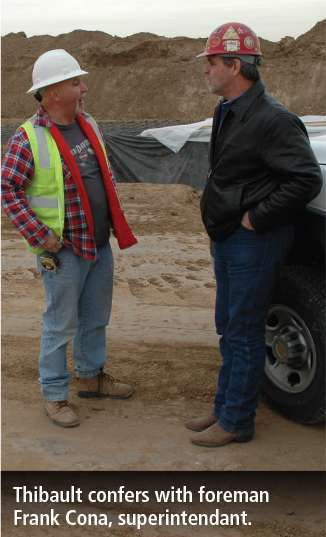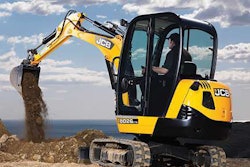
Mike Thibault has a favorite quote: “The harder I work, the luckier I get,” he says with a big Colorado grin.
But when the recession hit it brought problems that neither luck nor hard work seemed capable of solving. “It was terrible,” he says.
For two decades Thibault (pronounced Tee-bow) had flourished as the head of his growing company, T-Bone Construction. But the recession hit with a double whammy. Jobs disappeared, and the banks quit lending money. He owed money and people owed him money, but nobody could get money. Credit had frozen across the board.
Thibault laid off dozens of employees. By July 2009 he was down to 13 people, and for a while he thought he’d have to close up shop. But he had started his business on a shoestring right out of high school and wasn’t about to give up his company without a fight.
Expand your range
There wasn’t anything Thibault could do about the economy or the banks, but he reasoned the one thing he could control, or at least change, is the way he marketed his company.
In the past, T-Bone Construction had all the work it could handle in the Colorado Springs area. Thibault decided the only way to survive was to look for work out of state, so he got in his truck and started visiting potential customers, eventually securing jobs as far away as California and Missouri.

One such client, Bob Ferguson, general manager for Transwest Trucks, a Freightliner dealership, tells what it’s like to have Thibault as a preferred contractor:
“He’s a phenomenal guy, extremely responsive and quick to return a phone call. We were running our business while the construction was going on, so they did a lot of work overnight. He was very involved with overall project management and made time to meet with General Motors upper management and look at the other dealerships. GM mandated all the finishes and he found ways to meet all their requirements and save money.”
Avoid low-bid battles
Another advantage for a contractor working with other medium-size businesses is that they don’t have to slug it out with bottom feeders in a low-bid environment. “We do some hard bidding, but most of our work is negotiated, or bid-negotiated, Thibault says. “We even do a few cost-plus contracts.”
To get to this level a contractor has to have superb customer service and unquestionable ethics. “On ethics he’s an 11, on a scale from 1 to 10,” says Brad Edwards of Bradley Motors. “He treats everyone with respect and he always looks out for the best interest of his customers. When times were tough he could have taken an easy road out, but he didn’t take advantage of anyone. He’s just an all-around good guy.”
Keep the crews busy
During the recession, Thibault also kept his crews busy, by limiting the number of subcontractors he used. Whereas before he would sub out the drywall, during the recession he kept his guys on the payroll by having them do the drywall work. “No sense letting the subs add their 20 to 30 percent markup to my costs,” he says.
Thibault’s customer service is also enhanced by his five-person design department. On many jobs this saves the cost of hiring an architect and his team can deliver results quicker and more accurately. Fewer mistakes and miscommunications on the plans translate into fewer mistakes, cost overruns and delays in the field.
And as the economy began its slow crawl out of the recession, Thibault was prepared and eager to take his company to the next level.
The earthmoving side of his business had been relatively small and here he expanded aggressively. Before the recession he had two skid steers, a telescoping forklift and a backhoe. Since 2011 he has bought three excavators (a Cat 345C, 345D and 325D L), a wheel loader, backhoe, two new Cat skid steers, a new telescoping forklift and four semi-trucks with side dump bodies.
“The excavation side of the business is working out well,” he says. “It’s high risk, but its also high margin.”
Adding jobs and payroll
Today, Thibault has almost doubled his payroll from where it was during the recession, bringing the head count up to 64 people. He hired an architect, a vice president of operations, a CFO, a full-time safety manager and several new project managers. He also hired a property manager to run his 13 commercial and retail developments and has separated that part of the business from the construction side on the advice of his accountants.
The sitework for Thibault’s biggest contract to date, the Transwest Trucks dealership, is done and awaiting permitting for building to commence. It recently won the Brighton (Colorado) Development of the Year award. The company currently has five 7-11 stores on the books and three crews doing nothing but Love’s Travel Stops remodelings.
Some of Thibault’s more complex projects recently include building a chrome plant for chrome plating drilling pipe and radiation bunkers for testing electronic components used in outer space. He’s also building an RV facility for Transwest Truck, Trailer and RVs, and remodeling and expanding an ag dealership for Wagner Equipment in Yuma, Colorado.
Skilled labor shortage
The downside to a growing economy, however is finding skilled tradesmen.
“I’m struggling to find help,” Thibault says. And while the energy boom has been good for the economy in general, it has sucked up all the available labor, especially electricians, he says.
“Our electrical guys are getting 20 hours of overtime a week, but the oil fields are promising 70 hours a week,” Thibault says. “They’re getting the really aggressive guys who want to put in the hours and don’t mind the work. And I can’t promise 70 hours a week.” The uptick in housing has also made quality carpenters hard to find and truck drivers with CDLs are nearly impossible, he says.
Thibault says he’s tried all the usual venues for finding workers but with mixed results. He’s had some luck with Craigslist and has managed to find some electricians using employment agencies.
With all the new specialized help, Thibault intended to concentrate more on the big picture – finding more work and new clients. “That hasn’t completely happened, because we have so much stuff going on,” he says. “I’m not in on the day-to-day grind, but I am staying involved with the owners on projects as we work through the processes and solve some of the problems if they have them.”
Treat employees well
Faced with a tight labor market, Thibault does all he can to keep the crews he has.
“He’s got a good core of guys,” says customer Dick Janitell, JHW Enterprises. “He treats his employees too good.
“His employees like him,” says Edwards. “He’s got some great office staff, very loyal people. He had a couple of people who could have jumped ship during the recession, but they stayed, and now they’re glad they did.”
The fair treatment also extends to subcontractors. Dan Rial, of Rial Heating says: “I’ve known him for 15 years and he’s extremely ethical. He goes out of his way to make sure his subcontractors get paid – and he went through hard times just like everyone else. He’s loyal and doesn’t go around to get every lowball bid. And he’ll listen to his subs on different ideas on how to get the end result.”
Keys to success
Although Thibault has laid the groundwork for a strong company before the recession, he gives credit to a loyal customer base for helping T-Bone Construction emerge quickly from the downturn.
“It was our clients, those relationships,” he says. They gave us the work and paid us really fast. That helped with the cash flow and made a big difference. I didn’t have to fight to get paid.”
Having the internal resources to be more diversified also helped. “I wasn’t having to write big checks to subcontractors and paying their profit and overhead,” he says. “that was money we could bring into the company, especially on the excavation.”
For young contractors trying to make a go of it in this business, Thibault says you have to have the grit to tough it out. “The work is out there. You just have to get out there and find it,” he says
He also stresses the importance of customer relations. “Do what you say you’re going to do, and treat every customer as if they’re your only customer.”











